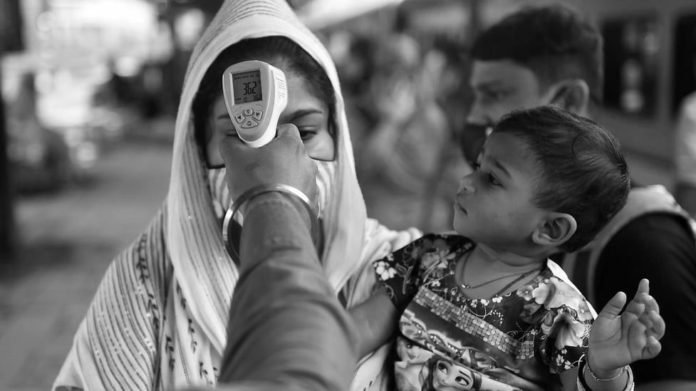India’s Covid curve showed marginal improvement today as the country reported 2.58 lakh cases, which is around 5 per cent lower than yesterday. As many as 385 people have died of Covid during the past 24-hour period, according to the Health Ministry.
The country’s caseload now stands at 3.73 crore. This includes 8,209 cases of the Omicron variant which is now present in 29 states.
The active cases now comprise 4.43 per cent of the total infections, while the national COVID-19 recovery rate has decreased to 94.27 per cent. The daily positivity rate is up from 16.28% to 19.65% while the weekly positivity rate was recorded at 14.41 per cent.
Maharashtra, one of the worst-hit states by the Covid pandemic, recorded 41,327 new coronavirus infections, 1,135 less than the day before, and 29 deaths. The overall caseload now stands at 72,11,810 and the death toll at 1,41,808. Eight new Omicron cases have been reported in the state, raising the tally of such infections to 1,738.
Delhi on Sunday reported 18,286 COVID-19 cases and 28 deaths, while the positivity rate dropped to 27.87 per cent from 30.64 per cent a day ago, according to health department data. State Health Minister Satyendar Jain has said that the city is conducting three times more diagnostic tests than the number recommended by the ICMR.
According to the Centre’s new guidelines, asymptomatic patients do not need to undergo a test. Also, contacts of laboratory confirmed COVID-19 patients need not get tested unless they have comorbidities or are aged above 60.
The new fatalities include 158 from Kerala and 36 from West Bengal. Of the total deaths reported so far in the country, 1,41,808 are from Maharashtra, 50,832 from Kerala, 38,431 from Karnataka, 36,989 from Tamil Nadu, 25,363 from Delhi, 22,963 from Uttar Pradesh and 20,088 from West Bengal.
A total of 1,47,492 children have lost either their mother or father or both parents due to COVID-19 and other reasons, the National Commission for Protection of Child Rights (NCPCR) said. The child rights body said that the maximum number of children are between the age group of eight to 13 years.
The countrywide vaccination drive against COVID-19 on Sunday completed one year, during which over 156.76 crore vaccine doses were administered. Lauding the vaccination drive, Prime Minister Narendra Modi said it has added great strength to the fight against the pandemic and has resulted in saving lives and protecting livelihoods.
The world’s 10 wealthiest men doubled their fortunes during the first two years of the coronavirus pandemic as poverty and inequality soared, a report said on Monday.
The coronavirus has killed at least 5,480,481 people since the outbreak emerged in China in December 2019, according to an AFP tally compiled from official sources on Saturday.
More about Omicron
The Omicron variant has been called a variant of concern by WHO based on studies that shows it has several mutations.
Still a lot of research is underway to evaluate its transmissibility, severity and reinfection risk.
The Omicron variant has been detected in several regions of the world. WHO reports that the likelihood of the Omicron variant spreading further globally is high.
It is not currently known if the Omicron variant is more or less severe than other strains of COVID-19, including Delta. Studies are ongoing and this information will be updated as it becomes available.
It is not yet clear whether Omicron can spread more easily from person to person compared to other variants, such as Delta.
However, being vaccinated and taking precautions such as avoiding crowded spaces, keeping your distance from others and wearing a mask are critical in helping to prevent the spread of COVID-19, and we know these actions have been effective against other variants.
Researchers are looking into any potential impact the Omicron variant has on the effectiveness of COVID-19 vaccines. Although information is still limited, WHO believes it is a reasonable assumption that the currently available vaccines offer some protection against severe disease and death.
It is also important to be vaccinated to protect against the other widely circulating variants, such as the Delta one. When it’s your turn, make sure to get vaccinated. If your vaccination involves two doses, it’s important to receive both in order to have the maximum protection.
According to WHO, early evidence suggests that people who have previously had COVID-19 could be reinfected more easily with Omicron, in comparison to other variants of concern. Information is still limited though and we will share updates as it becomes available.
Source: UNICEFRead more Health News
Latest update Omicron

